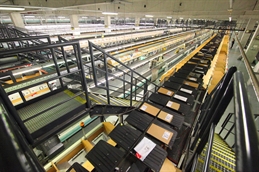
Recent air cargo related events such as the TIACA, FIATA and other conferences held in Seoul, Istanbul and Milan, respectively, underscore the growing significance of integrators in air cargo transportation, while highlighting some of the challenges airlines face.
Indeed, there were quite a few Cassandra cries heard at these events, warning airlines that failure to understand the customers’ needs and provide integrated services could lead to customers turning their backs on the industry. Glyn Hughes, global head of cargo for the International Air Transport Association (IATA), for example, did not mince words while telling the media in Seoul that the industry should not ignore the shippers’ need to have greater transparency, flexibility and reliability.
While integrators have achieved success in timely handling and delivery of cargo, the air cargo industry grapples with the question of how to further improve the supply chain. Some of the challenges confronting the industry include modal competition and pressures to cut costs.
Enno Osinga, senior vice president (cargo) at Amsterdam’s Schiphol Airport, suggested the streamlining of supply chains, as exemplified by integrators, to cut handling time by 48 hours, a goal set by the IATA. Given the limitations of airlines to fly any faster than they already do, Osinga believes that the onus of the responsibility to cut handling time and, in effect, costs should lie with other players in the supply chain such as airports, freight forwarders, truckers and handlers.
Osinga favours the integrators’ model as a way to reduce the 48 hour time because they maintain a completely integrated chain.
But it is not just reducing the 48-hour handling time that makes the integrators’ model so interesting. Other aspects of the integrators’ business also appeal to the customers.
The case of UPS’ operations serves as an alibi for the mass appeal of integrators. The company’s continuous growth in the volume of parcels as well as earnings in Europe, for example, seems to buck the trend in air cargo landscape where established carriers face weak demand and even growth slowdown.
Operations at the recently-expanded UPS European hub at Cologne/Bonn airport have benefitted in the small package segment. Following the expansion, sorting capacity jumped almost 100%, up from 110,000 packages an hour in 2006 to roughly 190,000 packages per hour this year. UPS executives, aware of the successful model, have been describing their company’s role as “not just enablers but primarily facilitators” of global trade and emerging market growth. Europe, meanwhile, accounts for half of UPS’ international business package.
Four major air-freight integrators, DHL, FedEx, TNT and UPS, account for the bulk of the global air cargo; all integrators – UPS purchased TNT in 2012 – have a hub-and-spoke organization of their networks, with hubs clustered in North America, Europe and Asia-Pacific.
But it would be one-sided to say that everything about integrators is better than the the rest of air cargo industry. Indeed, air cargo’s distinct advantage is flexibility, though its level of efficiency needs to be improved. This issue has been discussed at air cargo forums where speakers narrated their experiences with shippers who pressed for lower prices, and thus increased pressure to achieve greater productivity.
While acknowledging air cargo’s lower reliability, Jaedong Eum, vice president-cargo marketing at Korean Airlines, sees hope and opportunity for the industry, particularly, in segments such as e-commerce and cold supply chain.
Others say that the only way the mainstream air cargo industry could assert its position in the market is to improve supply chain transparency.
Oliver Evans, chief cargo officer of Swiss International Air Lines and chairman of the International Air Cargo Association, recently observed at the freight forwarders conference in Milan that despite their size and high visibility, integrators had carved out only a small slice of the global air freight pie.
He urged airlines, forwarders and ground handlers to communicate with shippers and consignees, as successfully done by integrators, and update customers by listing on their websites the exact location of the cargo at any given time and when the customer could expect it.
Many freight executives complain of unnecessary paperwork and repetitive data entries. Some carriers enter data nine or ten times from the time of receiving cargo and loading on the aircraft, recording available data over and over again.
They say that the airway bill should be the first of nearly 20 documents to become electronic, without which the industry will never reach the IATA target of full e-freight implementation by 2020.
Michael Göntgens, a spokesman for Lufthansa Cargo, succinctly summed up the relationship between cargo carriers and integrators. He told Asia Cargo News that integrators for the cargo carriers are “partners, customers and also competitors at the same time.”
“As partners, we operate, for example, with DHL Express our joint venture Aerologic, a jointly-operated airline which currently flies eight Boeing 777F freighter aircraft. Corporations such as DHL and UPS are, additionally, also important customers for Lufthansa Cargo and are members in our Global Partner Program in which we attend to our most important customers. But, naturally, we also compete with the integrators; at least, in a certain market segment like the small, standardized express consignments the business models overlap each other. But the big part of our business comprises large-volume freight or special products such as dangerous goods, refrigerated products or the transport of live animals – segments which require the classical air transportation,” he said.
But Göntgens also noted that integrators were looked upon with “great respect,” particularly in regard to standardization, automation and efficient formation of the transport chain. “In this respect, the integrators are clearly ahead of the classical air-freight,” he observed.
By Manik Mehta
International Correspondent | New York




